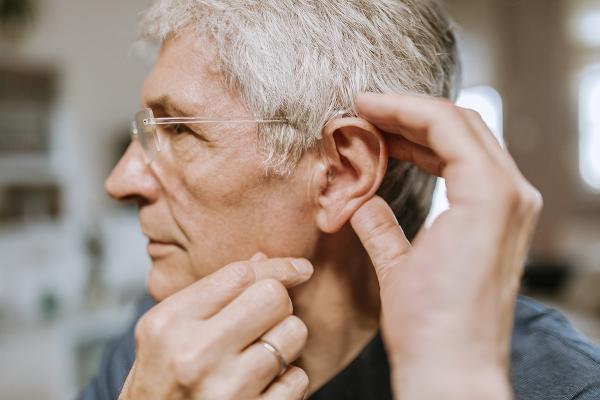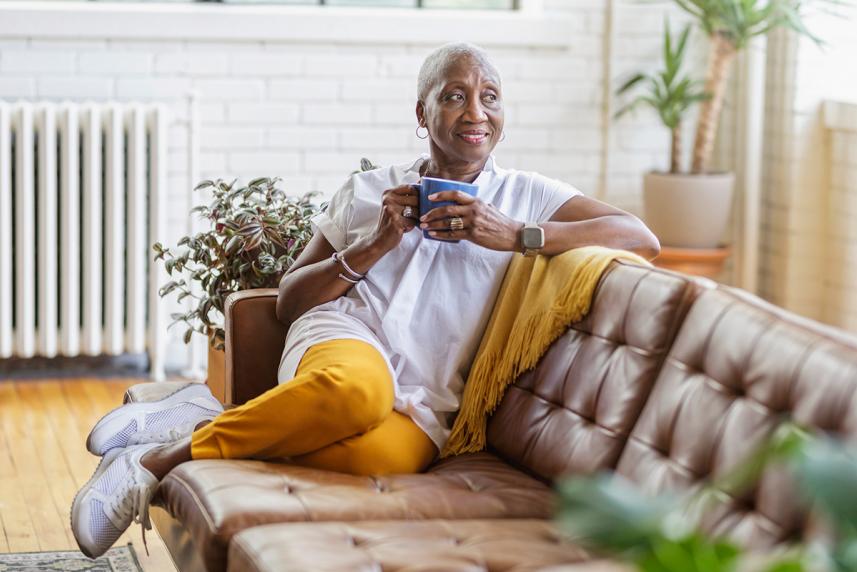
Could you be one of them?
Older adults who don’t hear well have a higher risk of falling at home. And it may be harder to hear smoke alarms and weather alerts too. Help protect yourself with this simple plan.

We like to think of our homes as safe havens. But they can be hazardous too, especially for older adults. Each year, almost 3 million adults older than age 65 end up in the emergency room due to product-related injuries (including falls and other accidents), according to the U.S. Consumer Product Safety Commission.1
Those odds only go up if you have trouble hearing. Older adults with hearing loss are 2.4 times more likely to fall than those who hear well.2 But falling is just one danger. Not being able to hear the smoke detector or carbon monoxide alarm is another, notes Rachel Sours. She’s a hearing aid specialist at Willoughby Hearing in North Plains, Oregon.
Another safety issue for people with hearing loss? “They may not be able to hear people approaching the front door or ringing the doorbell,” says Sours. Or know when to stay inside when they can’t hear weather warnings.
To help keep yourself or a loved one with hearing loss safe, follow these tips.
You likely have smoke detectors in your home. You may also have alarms installed on your stove in case you leave the oven or gas on. But they won't be much help if you can’t hear them when they go off. And that can be dangerous. Getting caught unaware by a fire is another big risk for older adults.1
Stay-safe move: Get alarms that use strobe lights or extra-loud sounds when they detect smoke or carbon monoxide in the house. These can be hardwired by an electrician or plugged in by you or a family member.3, 4 (Don’t forget to change the batteries when they need replacing.) Check with your hearing care professional for help finding the right devices for your needs.
Weather radios are essential for staying up to date on warnings about severe storms and tornadoes. The National Weather Service recommends that everyone has them, even people with hearing loss.5
Stay-safe move: Weather radios come with attachments that can shake the bed or set off flashing lights when there’s a warning for your area. They also come with text displays. That way, you can see exactly what type of weather system is headed your way, day or night.

Could you be one of them?
Break-ins and property theft are also more common among older adults.6 So, it’s important to know who’s approaching your home, whether they ring the bell or not.
Stay-safe move: Getting a security system with a camera can be a good idea. And many of these come with doorbells and apps to download on your phone.
If you or your loved ones wear hearing aids that connect to Bluetooth, you’ll be able to use the app to talk to and hear the person through your hearing aid, notes Sours. If not, there are special doorbells with flashing lights or ones that activate pagers that vibrate.4
Whether you have a landline or a cell phone, there are multiple ways to help make sure you don’t miss important calls.
They also light up when a text or video call comes in. You can also buy an attachment that will shake the bed in case you don’t want to miss a call while you sleep.
Even mild hearing loss triples your risk of falling, according to the American Speech-Language-Hearing Association.8 “Our balance system and our auditory system are very interconnected,” explains Sours.
There are a few theories about why the risk of falling goes up with hearing loss. One of them: You may lose spatial awareness, or directionality, notes Sours.
“That means being aware of where certain things are coming from. So, you might think something is to the right when it’s to the left and misplace your feet,” she says.
Your brain plays a role too. Because you are spending more brain power trying to hear and understand sounds, there are fewer resources to devote to keeping your balance or walking correctly.8
To minimize the chances of taking a tumble:9
Another great way to lower the chances of falling? Wear your hearing aids regularly. One study found that wearing them consistently cuts the risk of falling in half.2 If you’re not sure you need them, it may be time to get your ears checked by a hearing care professional. They can test your hearing and then suggest the right kind of hearing aids for you. That way, they can help you stay safer at home and when you’re out and about.
Through EPIC Hearing Healthcare, you get up to 3 follow-up visits at no extra cost — and a trial period to try out your new prescription hearing aids. Learn more.
Sources
Information is for educational purposes only and is not a substitute for the advice of a licensed medical provider. Consult your provider prior to making changes to your lifestyle or health care routine.
Hearing aids purchased in the Silver technology level will receive 1 follow-up visit.